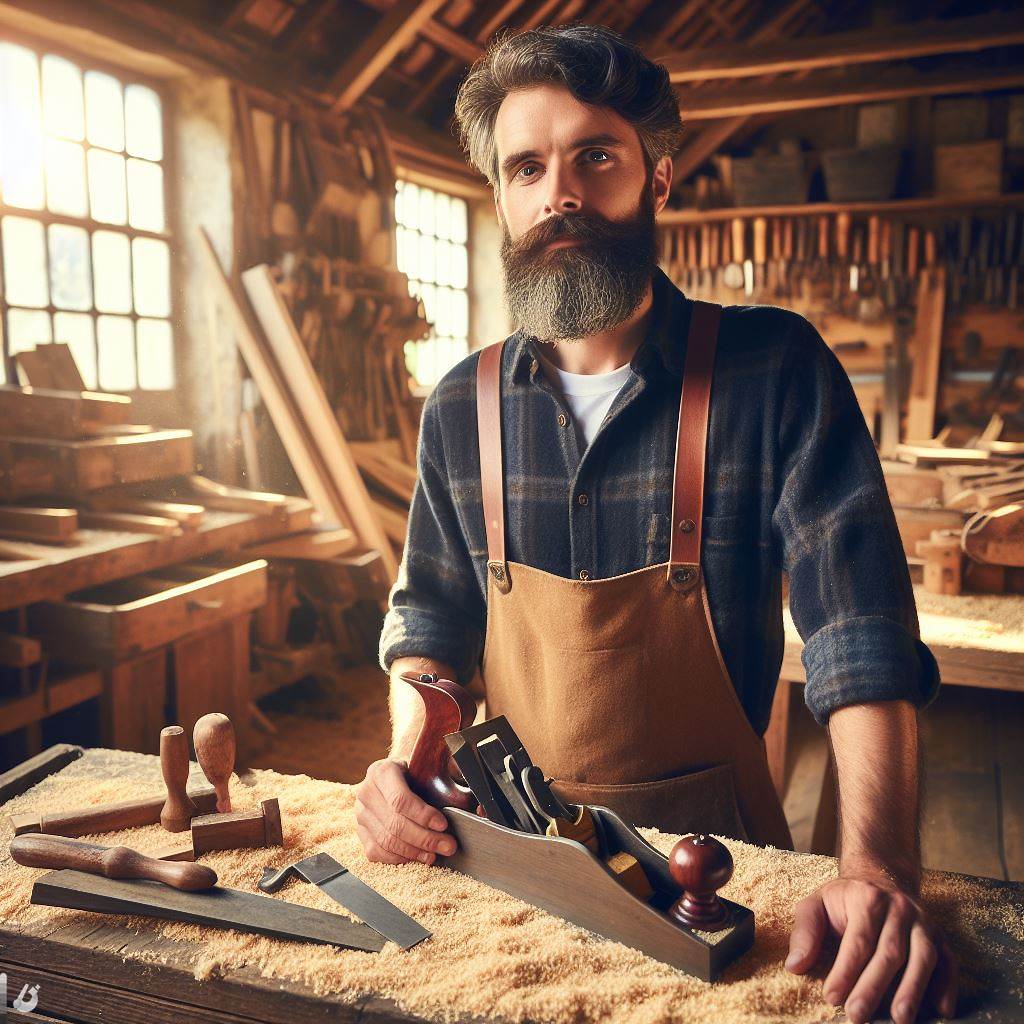Introduction
Joinery is a skilled profession in the UK that involves constructing wooden structures. It requires precision and expertise. Having the right tools is crucial for producing high-quality joinery work.
Without proper tools, the job becomes difficult, and the results may not be satisfactory. The right tools enable professionals to accurately measure, cut, shape, and assemble wooden pieces.
They ensure precision and efficiency in every step of the joinery process. With the right tools, professionals can achieve tight joints, smooth finishes, and overall excellent craftsmanship.
Quality tools also contribute to the safety of the workers by minimizing the risk of accidents and injuries.
Professionals in the UK highly recommend investing in top-quality joinery tools as they enhance the overall productivity and the quality of the end product.
In this blog, we will explore the top picks of UK professionals when it comes to joinery tools. We will discuss each tool’s features, benefits, and why it is favored by experts.
Whether you are a professional joiner or a DIY enthusiast, understanding the importance of these tools will help you achieve exceptional results in your joinery work.
Stay tuned for our in-depth exploration of the best joinery tools used by UK professionals.
Traditional Hand Tools for Joinery
Joinery professionals in the UK rely on a variety of traditional hand tools to create stunning woodwork masterpieces.
These tools have stood the test of time and continue to be their top picks. Here are some of the hand tools commonly used by joinery professionals:
- Bench chisels: These chisels are essential for cutting and shaping wood. They come in various sizes and are used for different tasks.
- Mortise chisels: Specifically designed for making mortise and tenon joints, these chisels have a thicker and stronger blade.
- Block plane: Used for trimming and smoothing wood, the block plane is versatile and provides excellent control.
- Shoulder plane: Ideal for trimming and fine-tuning shoulders on tenons, this plane ensures precise and accurate cuts.
- Marking gauge: This tool is used to mark straight lines and dimensions on wood, ensuring precision in joinery work.
- Coping saw: When it comes to intricate and curved cuts, joinery professionals rely on the coping saw.
- Mallet: The mallet is a heavy hammer-like tool used to strike chisels and other cutting tools, providing the necessary force.
Joinery professionals prefer using traditional hand tools for several reasons. Let’s explore the advantages of using these tools:
The advantages of using these tools
- Enhanced control: Traditional hand tools allow for better control over the cutting process, ensuring precise and accurate results.
- Skill development: Using hand tools requires skill and practice, allowing joinery professionals to hone their craftsmanship.
- Authenticity: Traditional hand tools offer a sense of authenticity and craftsmanship that cannot be replicated by power tools.
- Versatility: Hand tools can be used in various situations and provide flexibility in the joinery process.
- Quiet operation: Unlike power tools that can be noisy, hand tools operate quietly, making them ideal for working in residential areas.
- Less dust and debris: Hand tools produce less dust and debris, resulting in a cleaner and healthier working environment.
- Portability: Hand tools are lightweight and portable, allowing joinery professionals to work on-site or in different locations.
- Timeless appeal: Traditional hand tools have been used for centuries, and their timeless appeal adds value to the finished joinery work.
- Sustainable choice: Using hand tools reduces reliance on electricity, making it an eco-friendly and sustainable choice.
While power tools have their place in modern joinery, traditional hand tools remain the go-to choice for many professionals in the UK.
They offer unparalleled control, authenticity, and versatility, allowing craftsmen to showcase their skills and create stunning woodwork pieces.
In general, traditional hand tools play a vital role in the arsenal of joinery professionals in the UK. Bench chisels, mortise chisels, block planes, and other hand tools are essential for their work.
These tools provide enhanced control, skill development, and an authentic touch to the joinery process. By choosing traditional hand tools, professionals embrace the timeless appeal and sustainability of their craft.
Personalized UK Career Consulting
Receive tailored career guidance designed just for you. Get actionable steps and expert support to boost your career in 1-3 days. Take control of your career now.
Get StartedRead: Joinery 101: An Intro to UK’s Skilled Craft
Power Tools for Joinery
Joinery professionals in the UK have their top picks when it comes to power tools. These tools help them perform their tasks efficiently and effectively, ensuring high-quality joinery work.
In this section, we will provide an overview of the power tools preferred by UK joinery professionals, highlighting their benefits and efficiency.
- Circular saw: This versatile power tool is a must-have for any joinery professional. It is used for cutting large pieces of wood with precision and speed.
- Jigsaw: Joiners use this sawing tool to make intricate and curved cuts in various materials, including wood, metal, and plastic.
- Router: The router is a powerful tool that enables joiners to create decorative edges, cut grooves, and make precision cuts in wood.
- Power drill: a staple in any joinery workshop, drills holes and drives screws into wood efficiently, making it essential.
- Belt sander: Joiners rely on the belt sander to smooth and shape wood surfaces quickly and effectively. It is particularly useful for removing rough spots and imperfections.
- Random orbital sander: This handheld power tool is perfect for achieving a smooth and polished finish on various surfaces. It is ideal for joinery projects that require a high level of precision.
- Biscuit joiner: Joinery professionals use this tool to create strong and accurate joints. It cuts crescent-shaped holes, into which biscuits are inserted to join two pieces of wood together.
- Dowelling machine: This tool is used for creating dowel joints, which provide strength and stability to joinery projects. It ensures accurate alignment of dowels and holes for secure connections.
- Planer thicknesser: Joinery professionals rely on this tool to precisely plane and thickness wood, ensuring uniformity in size and thickness.
Benefits and efficiency of using power tools in joinery
Using power tools in joinery offers several benefits and significantly improves efficiency. Firstly, power tools save time and effort compared to traditional hand tools.
They allow joiners to complete tasks at a faster pace, increasing productivity. Power tools also provide better precision and accuracy, resulting in high-quality joinery work.
They enable joiners to make intricate cuts, create smooth surfaces, and achieve precise measurements, ensuring a professional finish.
Furthermore, power tools offer versatility in terms of the range of applications they can be used for.
With different attachments and accessories, joiners can perform various tasks using a single power tool, eliminating the need for multiple tools.
Moreover, power tools provide consistency in results. They ensure uniformity in cuts, shapes, and thickness, offering a professional and polished look to the final product.
In addition, power tools provide safety features that minimize the risk of accidents and injuries. They have built-in safety mechanisms, such as blade guards and ergonomic designs, to protect users during operation.
Overall, power tools are essential for joinery professionals in the UK.
They offer efficiency, precision, versatility, consistency, and safety, making them valuable tools for accomplishing high-quality joinery work.
Whether it’s cutting, shaping, drilling, or sanding, power tools are a must-have in the toolbox of any joinery professional.
Joinery professionals rely on a variety of measuring and marking tools to ensure accuracy in their work. These tools play a crucial role in the success of any joinery project.
Your Dream Job Starts with a Perfect CV
Get a tailored CV and cover letter that captures your unique strengths and stands out in your industry. Let us help you make an unforgettable first impression.
Get StartedLet’s take a closer look at some of the essential measuring and marking tools used by UK professionals.
Read: Top UK Joinery Schools & Training Programs

Essential Measuring and Marking Tools
- Tape Measure: A tape measure is a must-have tool for joinery work. It allows professionals to take precise measurements of length, width, and height, ensuring the correct dimensions for each component.
- Combination Square: This versatile tool consists of a ruler and a 90-degree square. It is used to check and mark right angles accurately, ensuring the pieces being fitted together are perfectly square.
- Sliding Bevel: A sliding bevel is used to transfer angles accurately. Joinery often involves angled cuts, and this tool allows professionals to match and replicate those angles precisely.
- Scribing Gauge: A scribing gauge is used to mark lines parallel to an edge or to scribe lines along curved surfaces. It helps joiners maintain consistency and achieve clean and accurate markings.
- Try Square: A try square is similar to a combination square but is primarily used for checking the squareness of edges and corners. It helps ensure that joinery components fit together seamlessly.
- Marking Knife: A marking knife is a sharp, pointed tool used to make precise marks on the wood surface. It creates an accurate guide for cutting or chiseling.
The accuracy of joinery work is paramount and cannot be compromised. Measuring and marking tools play a crucial role in achieving the desired precision.
Let’s explore the importance of accuracy and how these tools contribute to the overall success of a project.
Importance of accuracy in joinery work and the role of measuring tools
Accurate measurements are essential for joinery projects, as even the slightest discrepancy can compromise the fit and functionality of the final product.
Measuring tools like tape measures enable professionals to take precise measurements, ensuring a perfect fit between components.
Marking tools guide joiners in specifying cut locations. The combination square and sliding bevel, for instance, precisely transfer angles, ensuring snug joints and neat cuts.
Without these measuring and marking tools, professionals would struggle to maintain consistency and achieve the level of precision required in joinery work.
Imagine trying to assemble a cabinet or a staircase without knowing if your measurements are correct or if your angles are accurate. It would be nearly impossible to achieve a satisfactory result.
Additionally, accuracy is vital for aesthetic reasons. Joinery work often involves visible components, such as cabinets, furniture, or staircases.
The slightest discrepancy in measurements or angles can be noticeable and negatively impact the overall appearance of the finished piece.
By utilizing measuring and marking tools, joinery professionals can ensure that each piece fits perfectly, angles are precise, and joints are seamless.
The use of these tools not only saves time but also enhances the quality and durability of the final product.
Basically, joinery professionals in the UK rely on a range of measuring and marking tools to achieve accuracy in their work.
Optimize Your LinkedIn for Success
Boost your LinkedIn profile with a professional bio, keyword-rich headline, and strategic recommendations that attract recruiters. Stand out from the crowd and get noticed.
Optimize NowThese tools, including tape measures, combination squares, sliding bevels, scribing gauges, try squares, and marking knives, are essential for achieving the desired precision and consistency in joinery projects.
Without these tools, it would be challenging to execute the complex measurements and angles necessary for a successful outcome.
Read: UK Joiners’ Salary Guide: Expectations vs. Reality
Find Out More: Challenges Facing Today’s Construction Workers
Specialist Tools for Specific Joinery Tasks
Joinery is a skilled trade that requires precision and expertise. To achieve the best results, professionals in the UK rely on specialized tools designed for specific joinery tasks.
Let’s take a closer look at some of the commonly used tools in the field.
Examination of specialized tools commonly used for specific joinery tasks
Dovetail Saw
A dovetail saw is a small, fine-toothed saw used for cutting dovetail joints. This type of joint requires precise and angled cuts, and a dovetail saw is specifically designed for this purpose.
It allows professionals to create strong and aesthetically pleasing joints.
Dovetail Jig
A dovetail jig is a tool that helps in creating dovetail joints accurately and efficiently. It guides the cutting and shaping process, ensuring consistent results.
By using a dovetail jig, professionals can save time and improve the quality of their work.
Tenon Saw
A tenon saw is another specialized tool commonly used in joinery. It is designed to cut tenons, which are projections on the end of a piece of wood that fit into a mortise.
The tenon saw’s fine teeth and rigid back make it perfect for precise and controlled cuts.
Tenoning Jig
A tenoning jig is a device that holds the workpiece securely and guides the saw for cutting tenons. It ensures accuracy and safety while working with tenons.
This tool is indispensable for professionals who need to create strong and reliable joints.
Rabbet Plane
A rabbet plane is a hand tool used for cutting rabbets, which are recesses or grooves on the edge of a piece of wood.
This tool allows for controlled and precise cuts, making it easier to fit pieces of wood together snugly.
Router Plane
A hand tool for precise woodworking, the router plane excels in cutting, cleaning, and smoothing wood recesses or grooves.
With a router plane, professionals can achieve smooth and accurate finishes on their joinery projects.
Mortising Machine
A mortising machine is a power tool used for cutting mortises, which are rectangular slots or cavities in wood.
It allows for accurate and efficient cutting, making it easier to create strong joints. This tool is particularly useful when working with a high volume of mortises.
Benefits of Having Specialized Tools for Precision Work
Using specialized tools for specific joinery tasks offers several benefits for professionals in the UK.
- Precision: Specialized tools are designed to provide precise cuts and shapes, resulting in accurate joinery.
- Efficiency: These tools enable professionals to complete their work more efficiently, saving time and effort.
- Consistency: Using specialized tools ensures consistent results, helping professionals maintain high-quality standards.
- Safety: These tools often come with safety features and mechanisms that reduce the risk of accidents.
- Accuracy: By using the right tools, professionals can achieve accurate measurements and cuts, enhancing the overall quality of their work.
- Versatility: Specialized tools can be versatile, allowing professionals to perform a range of joinery tasks with just one tool.
Ultimately, specialized tools play a crucial role in the field of joinery.
Professionals in the UK rely on tools such as dovetail saws, tenon saws, rabbet planes, and mortising machines to achieve precision and quality in their work.
By using these tools, they can create strong and aesthetically pleasing joints, ensuring customer satisfaction and professional success.
Read: Eco-Friendly Practices in UK Joinery Today
Conclusion
Having the right joinery tools is crucial for professionals in the UK. With the right tools, joiners can ensure the highest level of craftsmanship and efficiency in their work.
Encourage aspiring joinery professionals to invest in quality tools; although it demands a substantial financial commitment, it pays off in the long run.
Joinery tools play a crucial role in achieving professional success in the UK. They enable joiners to create precise, durable, and visually appealing woodwork.
Without the right tools, it’s impossible to achieve the level of precision and finesse that clients expect from professionals in this industry.
It’s essential for aspiring joinery professionals to understand the importance of investing in quality tools.
By doing so, they set themselves up for success and can confidently take on any project, knowing they have the right tools for the job.
Joinery tools are more than just instruments used in the woodworking process. They are a vital component in the journey towards becoming a successful joiner in the UK.
[E-Book for Sale]
500 Cutting-Edge Tech Startup Ideas for 2024 & 2025: Innovate, Create, Dominate
$19.99 • 500 Tech Startup Ideas • 62 pages
You will get inspired with 500 innovative tech startup ideas for 2024 and 2025, complete with concise descriptions to help you kickstart your entrepreneurial journey in AI, Blockchain, IoT, Fintech, and AR/VR.




